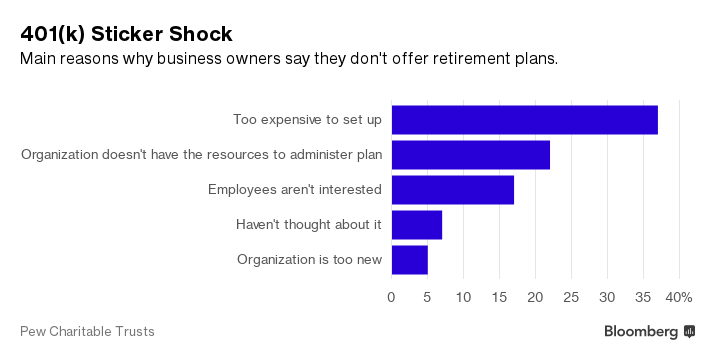Still, business owners were skeptical about the government getting involved. Just 41 percent supported the federal government sponsoring auto-IRAs, with 59 percent opposed, and just 44 percent supported state government-sponsored auto-IRAs. By contrast, 82 percent liked the idea of mutual fund companies sponsoring auto-IRAs, and 72 percent favored insurance companies running the program.
It's not clear how these business owners will feel about specific auto-IRA programs when they're rolled out over the next few years. The auto-IRAs are technically public-private partnerships, with state governments planning to hire private investment managers to administer the accounts.
"The good news is that small-business owners are receptive to policy solutions, because they do have a problem on their hands," said John Scott, director of Pew's retirement savings project.

The top reason business owners said they support the auto-IRA concept was that "it would help my employees." Poor retirement options (and no retirement options at all) cause problems in the workplace, and not just with recruiting. "If employees don't have some money set aside, how are they going to retire?" said Sher, the actuary. Business owners tend to want an "orderly transition to retirement," he said, one that lets older workers stop working if they want, giving employers the chance to groom younger workers for promotions.
Other ideas at the state and federal levels may appeal more to business owners than auto-IRAs do. New Jersey and Washington State are setting up retirement plan marketplaces—state-run websites on which employers could shop for lower-cost retirement plans. All but 14 percent of business owners told Pew they like this idea.
Utah Senator Orrin Hatch, the Republican chairman of the Senate Finance Committee, has proposed offering additional incentives for small businesses to set up retirement plans. He would also make it easier for employers to join so-called "multi-employer plans," allowing businesses to join forces to share the costs of offering a plan. "I look forward to working with my fellow Finance Committee members and senate leadership on how to get these much-needed policies enacted into law," Hatch said in a statement.
Perhaps it's natural for business owners to prefer incentives to government mandates—and just as natural for employees to prefer the mandates. In a survey released in November by Natixis Global Asset Management, almost 80 percent of U.S. workers said employers should be required to offer retirement plans. Almost three-quarters said companies should have to make contributions to their retirement account, something no state is currently planning to require.
This article was provided by Bloomberg News.








